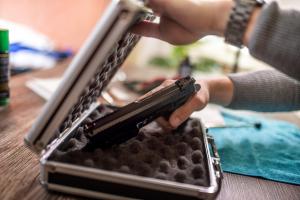
The Effect of Louisiana's Open Carry Laws on Vehicle Accidents
Stephen M. Morrow, a lawyer at Morrow Law Firm in Opelousas, Louisiana, notes that the presence of firearms in vehicles involved in accidents can escalate tensions, complicate investigations, and raise additional legal questions. Morrow Law Firm, led by William P. Morrow, John Michael Morrow, Jr., and Stephen M. Morrow, has seen the impact of such issues on personal injury and liability cases.
“Firearms in vehicles can create unique challenges in accident scenarios,” says Morrow. “Understanding the legal framework and potential consequences is critical for addressing these situations effectively.”
Understanding Louisiana’s Open Carry Laws
Louisiana allows individuals to openly carry firearms without a permit, provided they are legally allowed to possess a firearm under federal and state laws. This includes carrying firearms in vehicles. The presence of firearms in cars and trucks is common in the state, particularly in rural areas and among those who rely on firearms for hunting or personal protection.
While open carry is legal, there are restrictions in certain locations, such as schools, government buildings, and establishments that serve alcohol. Additionally, individuals must comply with federal and state laws regarding firearm possession, transportation, and usage.
Challenges in Vehicle Accident Scenarios
When firearms are present during a vehicle accident, they can complicate an already tense situation. Law enforcement, legal representatives, and those involved in the accident must navigate these complexities while ensuring safety and compliance with the law. Key challenges include:
Escalation of Tensions: The presence of a visible firearm can heighten emotions and increase the risk of confrontations between involved parties.
Law Enforcement Protocols: Officers responding to an accident must ensure their own safety while determining the role, if any, the firearm played in the incident.
Determining Liability: If a firearm is discharged during or after an accident, it may raise additional questions about negligence, recklessness, or intent.
These challenges underscore the importance of addressing firearms responsibly in the context of vehicle accidents.
Legal Implications for Liability and Damages
The presence of firearms in vehicle accidents introduces additional considerations when determining liability and damages. Factors that may come into play include:
Negligent Discharge: If a firearm is discharged during an accident, determining whether it was accidental or intentional is critical. An accidental discharge could lead to claims of negligence, while an intentional discharge may result in criminal charges or additional civil liability.
Storage and Transportation: Firearms must be transported in compliance with state and federal laws. Improper storage, such as having a loaded firearm unsecured in a vehicle, could influence liability determinations.
Emotional Distress: The presence of a firearm during an accident may contribute to claims of emotional distress, particularly if the firearm was displayed or perceived as a threat.
In addition to standard damages such as medical expenses, property damage, and lost wages, cases involving firearms may also include claims related to psychological trauma or punitive damages in certain circumstances.
Preventative Measures and Public Safety
Reducing the risks associated with firearms in vehicle accidents requires proactive measures from both firearm owners and the broader community. Key recommendations include:
Safe Storage: Firearms should be stored securely in vehicles, ideally in locked compartments or gun safes, to prevent unauthorized access and reduce the risk of accidental discharge.
Avoiding Escalation: Individuals involved in accidents should prioritize de-escalation and cooperation. Displaying or reaching for a firearm during a confrontation can escalate tensions and lead to unintended consequences.
Training and Awareness: Firearm owners are encouraged to pursue training on proper handling, storage, and legal responsibilities to ensure safe practices in all situations.
Law Enforcement and Community Education
Law enforcement agencies play a vital role in addressing the intersection of open carry laws and vehicle accidents. By incorporating firearm-specific protocols into accident response training, officers can ensure safety while upholding legal standards. Additionally, community education initiatives can promote awareness of firearm safety and encourage responsible behavior among firearm owners.
Addressing Disputes and Legal Claims
Accidents involving firearms often require thorough investigations to determine the role of the firearm in the incident and establish liability. Legal claims in these cases may involve multiple parties, including the driver, passengers, and even firearm manufacturers or retailers in cases of defective firearms.
Effective legal representation is critical for navigating the complexities of these claims. Gathering evidence, such as witness statements, accident reports, and firearm documentation, is essential for building a strong case. Understanding the interplay between open carry laws and liability standards ensures that claims are handled accurately and fairly.
Conclusion
Louisiana’s open carry laws are an important part of the state’s legal framework, but their impact extends into areas such as vehicle accidents, where they introduce unique challenges and considerations. The presence of firearms in vehicles can complicate liability, enforcement, and public safety, requiring careful navigation of the law and its applications.
Addressing these issues requires a comprehensive understanding of the legal responsibilities of firearm owners and the broader implications of open carry in accident scenarios. By prioritizing safety, compliance, and de-escalation, individuals can help mitigate the risks associated with firearms during vehicle accidents. For those involved in such incidents, seeking appropriate legal guidance is essential to resolving disputes and ensuring accountability under the law.
Morgan Thomas
Rhino Digital, LLC
+1 504-875-5036
email us here
Visit us on social media:
Facebook
Distribution channels: Culture, Society & Lifestyle, Insurance Industry, Law
Legal Disclaimer:
EIN Presswire provides this news content "as is" without warranty of any kind. We do not accept any responsibility or liability for the accuracy, content, images, videos, licenses, completeness, legality, or reliability of the information contained in this article. If you have any complaints or copyright issues related to this article, kindly contact the author above.
Submit your press release

